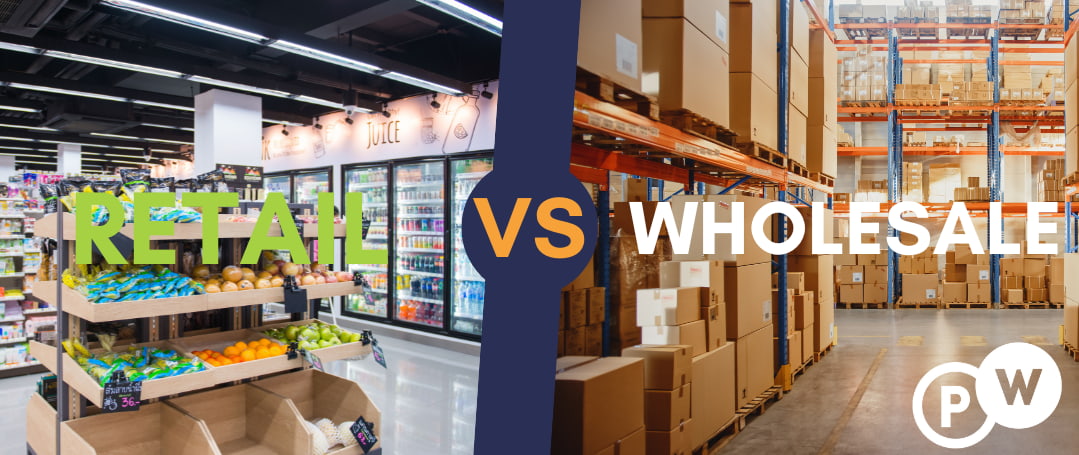
Retail and wholesale represent two different stages of the distribution chain which transfers products from manufacturers to consumers. Despite the similarities when it comes to marketing and distributing products, retailers and wholesalers widely differ in terms of their target audience, quantities carried, inventory management and profit margins made.
For businesses looking to sell their products, there are several factors that are likely to determine whether you decide to be a retailer or a wholesaler. A key decision that will determine your business model, there are numerous business factors to consider.
What is Retail?
Retail refers to the sale of goods and services to consumers for their use. The final link in the distribution chain, retailers usually operate via physical shops, department stores and online platforms that are open to the public who can explore and purchase products.
Retailers, such as convenience stores, online e-commerce websites and department stores, often purchase their products from wholesalers, such as Pound Wholesale, and retailers mark up prices to cover operational costs, generate profit and establish their business.
Positives & Negatives of Retail
Retailers, which are generally publicly visible entities and businesses, can have a greater aspirational ceiling than a wholesaler as their brand is exposed to a greater number of consumers. The face of a brand to consumers, retailers can utilise an array of strategies and techniques to merchandise and reach a greater number of customers than a wholesaler, who usually only trade with other businesses.
As retailers sell directly to consumers, retailers have the power to control their prices to command the lion’s share of profit in the distribution chain. Moreover, as retailers typically sell products in singular quantities, they’re able to command higher prices, whereas businesses earlier in the distribution chain have lower profit margins to compensate for purchasing in larger volumes.
As a public-facing entity, retailers are able to control their brand and customer experience for direct customer interaction, which enables retail businesses to enhance their reputation among customers and the wider online community.
Despite the obvious advantages retailers have in terms of attracting sales and customers, there are negative points to running a retail business. Retailers usually have higher overhead costs than wholesalers, as there is a cost associated with maintaining physical and online stores, marketing budgets, staff wages and inventory management.
Being a renowned business as a retailer enhances visibility, which can often have a negative impact as your store can receive a negative reputation, either fairly or unfairly, as a result of customer reviews and online communications.
As a retailer, it’s highly likely that you will experience more competition within your market, simply as there are such a huge range of brick-and-mortar shops and online retailers competing for the attention of the general public.
Positives vs Negatives of Retail
| Positives | Negatives |
| Higher Profit Margin | High Overhead Costs |
| Increased Customer Interaction | Increased Competition |
| Larger Target Audience | Negative Reputation |
What is Wholesale?
Wholesale refers to the act of distributing large quantities of goods that are then retailed or utilised by other businesses. Acquiring vast quantities of stock from manufacturers and international suppliers, wholesale is an essential part of the supply chain, and is usually a B2B environment.
Wholesalers have a huge role to play in the economy and shape the final price that is passed onto consumers.
Positives & Negatives of Wholesale
For businesses looking to distribute their goods in the wholesale market, there are numerous positive and negative factors to consider.
Wholesalers are generally able to attain stock at a superior unit price to retailers due to the quantity purchased, in addition to maintaining unique relationships with manufacturers and international suppliers.
As wholesale is a considerably smaller industry than retail, despite moving a greater number of units, aspirational wholesalers are likely to face less competition than businesses looking to launch into the retail space. With less competition, wholesalers are likely to find it easier to reach their target audience both locally and nationally.
Wholesalers are likely to face less overhead costs than retailers. With no need to manage a physical store or public space, and less importance of investing in marketing, advertising and customer services, wholesalers are able to retain more of their revenue and budget to reinvest in other aspects of the business. Though wholesalers may require larger properties to store stock, they can build or utilise property in cheaper areas as access isn’t generally necessary for the general public.
As wholesalers are not the final step of the supply chain and sell in bulk quantities, wholesalers have lower profit margins than retailers. This gives wholesalers less of a chance to offer special prices and discounts, and can be more harmful if orders are cancelled, damaged or returned.
Naturally, as wholesalers are a more specialised business than retail, wholesalers may find it difficult to reach businesses and organisations, and will face challenges when it comes to maintaining close relationships with clients.
By carrying greater quantities of stock, wholesalers are more likely to face complex challenges when it comes to inventory management. Moreover, selling in bulk is more likely to lead to stock availability issues as it’s difficult to anticipate when a business or organisation may acquire large quantities of units.
| Positives | Negatives |
| Cheaper Unit Cost | Lower Profit Margin |
| Less Overhead Costs | Inventory Management/Stock Availability |
| Less Competition | Maintaining Relationships |
Differences Between Retail & Wholesale
For businesses looking to get into the business of selling products, there are innumerable differences to weigh up between retail and wholesaler. This varies from target audience, pricing and inventory to operational costs and marketing activities. Whilst retailers typically operate in the B2C market, wholesalers are in the B2B market, which leaves businesses with a lot they need to know before making a decision.
Determining whether to sell products via wholesale or retail channels is likely to lead to the formulation of totally alternate business models.
| Retailers | Wholesalers | |
| Customers | B2C | B2B |
| Pricing | High Margin | Low Margin |
| Inventory | Low Storage | Bulk Storage |
| Overheads | High | Low |
Prices & Profit Margin – Retail Vs Wholesale
Wholesale prices are typically lower than retail prices as wholesalers generally sell to retailers in bulk, who mark up the prices to cover their own costs to generate a profit. Pricing retail from wholesale varies greatly depending on the product, industry and competitive landscape.
Small businesses that purchase stock in bulk from wholesalers typically market their products at a lower unit cost than the recommended retail price to win business from larger retailers.
Retailers have a greater commend of their product prices, and can rely on their reputation and popularity in order to create conversation. Their marked-up price is intended to cover expenses like their high overhead costs, marketing and advertising and the cost of providing shop staff and in-store customer experiences.
Inventory Management – Retail Vs Wholesale
As wholesalers tend to sell products in bulk, these businesses will have to manage large quantities of stock. This requires greater space, enhanced inventory management and careful planning to ensure stock levels can be the demands of their clients.
Retailers inventory management approach will be largely defined by consumer demand. The challenge for retail businesses is discovering the balance between sufficient stock to meet customer demand, without storing too much or too little inventory, though this is also a challenge for wholesalers.
This illustrates the importance of both retailers and wholesalers staying abreast of industry trends and measuring the popularity of their product to ensure adequate preparedness in terms of inventory management.
The Retail Vs Wholesale Question for My Business
As a business, your product, inventory management capacity and objectives and goals will determine whether your should distribute product as a wholesaler or retailer. Pound Wholesale provides unbeatable wholesale prices on over 7,000 products to offer unique value for retailers and businesses.
| Your Business Should Consider Selling Retail if you can | Your Business Should Consider Selling Wholesale if you can |
| Fulfil the needs of your target market | Manage large bulk orders |
| Invest in Marketing & Advertising | Distribute pallets and bulk stock |
| Establish a strong reputation for your bran | Provide suitable storage for inventory management |
| Manage B2C transactions & customer service | Can maintain B2B relationships |

